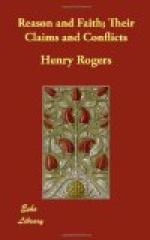But the first and most natural question to ask is obviously this: how any mortal can pretend to extract any thing certain, much more divine, from records, the great bulk of which he has reduced to pure frauds, illusions, or legends,—and the great bulk of the remainder to an absolute uncertainty of how little is true and how much false?* Surely it would need nothing less than a new revelation to reveal this sweeping restriction of the old; and we should then be left in an ecstasy of astonishment-first, that the whole significance of it should have been veiled in frauds, illusions, or fictions; secondly, that its true meaning should have been hidden from the world for eighteen hundred years after its divine promulgation; thirdly, that it should be revealed at last, either in results which needed no revelation to reveal them, or in the Egyptian darkness of the allegorieo-metaphysico-mystico-logico-transendental, ‘formulae’ of the most obscure and contentious philosophy ever devised by man; and lastly, that all this superfluous trouble is to give us, after all, only the mysteries of a most enigmatical philosophy: For of Hegel, in particular, we think it may with truth be said that the reader is seldom fortunate enough to know that he knows his meaning, or even to know that Hegel knew his own. ____
* Daub naively enough declares that, if you except all that relates to angels, demons, and miracle, there is scarcely any mythology in the Gospel.’ An exception which reminds one of the Irish prelate who, on reading ‘Gulliver’s Travels,’ remarked that there were some things in that book which he could not think true. ____
Whether, then, we regard the original compilers of the evangelic records as inventing all that Paulus or Strauss rejects, or sincerely believing their own delusions, or that their statements have been artfully corrupted or unconsciously disguised, till Christ and his Apostles are as effectually transformed and travestied as these dreamers are pleased to imagine, with what consistency can we believe any thing certain amidst so many acknowledged fictions inseparably incorporated with them? If A has told B truth once and falsehood fifty times, (wittingly or unwittingly,) what can induce B to believe that he has any reason to believe A in that only time in which he does believe him, unless he knows the same truth by evidence quite independent




